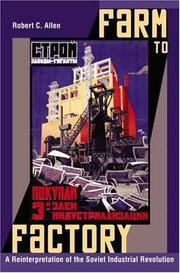| Listing 1 - 10 of 26 | << page >> |
Sort by
|

ISBN: 0415110076 Year: 1995 Publisher: London Routledge
Abstract | Keywords | Export | Availability | Bookmark
 Loading...
Loading...Choose an application
- Reference Manager
- EndNote
- RefWorks (Direct export to RefWorks)
Mass communications --- Sociology of culture --- #SBIB:309H1521 --- Radio- en/of televisieprogramma’s met een amusementsfunctie en/of esthetische functie --- Television soap operas --- Social aspects. --- Soap operas --- Soap operas, Television --- Telenovelas --- Television series --- Social aspects

ISBN: 0807843164 Year: 1991 Publisher: Chapel Hill, N.C. University of North Carolina
Abstract | Keywords | Export | Availability | Bookmark
 Loading...
Loading...Choose an application
- Reference Manager
- EndNote
- RefWorks (Direct export to RefWorks)
Theatrical science --- anno 1900-1999 --- United States --- Burlesque (Theater) --- History --- Popular culture --- 19th century --- 20th century --- United States of America

ISBN: 0691006962 9780691006963 Year: 2003 Publisher: Princeton (N.J.) Princeton university press
Abstract | Keywords | Export | Availability | Bookmark
 Loading...
Loading...Choose an application
- Reference Manager
- EndNote
- RefWorks (Direct export to RefWorks)
"Robert Allen argues that the USSR was one of the most successful developing economies of the twentieth century. He reaches this provocative conclusion by recalculating national consumption and using economic, demographic, and computer simulation models to address the "what if" questions central to Soviet history. Moreover by comparing Soviet performance not only with advanced but with less developed countries, he provides a meaningful context for its evaluation." "While highlighting the previously under-emphasized achievements of Soviet planning, Farm to Factory also shows, through methodical analysis set in fluid prose, that Stalin's worst excesses - such as the bloody collectivization of agriculture - did little to spur growth. Economic development stagnated after 1970, as vital resources were diverted to the military and as a Soviet leadership lacking in original thought pursued wastefully investments."--BOOK JACKET.
History of Eastern Europe --- anno 1900-1999 --- Russian Federation --- Industrialization --- Industrialisation --- Soviet Union --- URSS --- Economic policy. --- Economic conditions. --- Politique économique --- Conditions économiques --- Economic policy --- Economic conditions --- 338.22 <47> --- 338 <09> <47> --- Economische organisatieleer. Economisch beleid. Economische politiek--Rusland. Sovjet-Unie --- Economische geschiedenis--Rusland. Sovjet-Unie --- Economische groei. --- Industrialisatie. --- Industrialisierung. --- Wirtschaftspolitik. --- Wirtschaftswachstum. --- Sowjetunion. --- 338 <09> <47> Economische geschiedenis--Rusland. Sovjet-Unie --- 338.22 <47> Economische organisatieleer. Economisch beleid. Economische politiek--Rusland. Sovjet-Unie --- Russia --- Politique économique --- Conditions économiques --- Industrialization - Soviet Union --- Soviet Union - Economic policy --- Soviet Union - Economic conditions
Book
ISBN: 0198282966 0191684422 Year: 1992 Publisher: Oxford Oxford university press
Abstract | Keywords | Export | Availability | Bookmark
 Loading...
Loading...Choose an application
- Reference Manager
- EndNote
- RefWorks (Direct export to RefWorks)
Agriculture --- Farmers --- Inclosures --- Economic aspects --- History --- -Farmers --- -Inclosures --- -Enclosures --- Land tenure --- Real property --- Farm operators --- Operators, Farm --- Planters (Persons) --- Agriculturists --- Rural population --- Farming --- Husbandry --- Industrial arts --- Life sciences --- Food supply --- Land use, Rural --- -History --- Law and legislation --- History. --- -Economic aspects --- Enclosures --- Economic aspects&delete& --- England --- Midlands (England) --- Landbouwers --- Inclosures - England - Midlands. --- Farmers - England - Midlands - History. --- Agriculture - Economic aspects - England - Midlands - History.
Book
ISBN: 9780199596652 0199596654 Year: 2011 Publisher: Oxford ; New York : Oxford University Press,
Abstract | Keywords | Export | Availability | Bookmark
 Loading...
Loading...Choose an application
- Reference Manager
- EndNote
- RefWorks (Direct export to RefWorks)
AA / International- internationaal --- 331.100 --- 338 --- 930.3 --- OF 3 2015-2016 --- Economische geschiedenis: algemeenheden. --- Economische toestand. Economische ontwikkeling --- Wereldgeschiedenis --- OO Economische geschiedenis --- Economic history. --- Economic indicators. --- internationalisering --- economie --- geschiedenis --- Economic history --- Economic indicators --- Business indicators --- Indicators, Business --- Indicators, Economic --- Leading indicators --- Quality of life --- Economic forecasting --- Index numbers (Economics) --- Social indicators --- Economic conditions --- History, Economic --- Economics --- Economische geschiedenis: algemeenheden --- Economic order
Multi
ISBN: 9780521687850 9780521868273 0521868270 0521687853 9780511816680 1107460409 0511816685 Year: 2014 Publisher: Cambridge Cambridge University
Abstract | Keywords | Export | Availability | Bookmark
 Loading...
Loading...Choose an application
- Reference Manager
- EndNote
- RefWorks (Direct export to RefWorks)
Why did the industrial revolution take place in eighteenth-century Britain and not elsewhere in Europe or Asia? In this convincing new account Robert Allen argues that the British industrial revolution was a successful response to the global economy of the seventeenth and eighteenth centuries. He shows that in Britain wages were high and capital and energy cheap in comparison to other countries in Europe and Asia. As a result, the breakthrough technologies of the industrial revolution - the steam engine, the cotton mill, and the substitution of coal for wood in metal production - were uniquely profitable to invent and use in Britain. The high wage economy of pre-industrial Britain also fostered industrial development since more people could afford schooling and apprenticeships. It was only when British engineers made these new technologies more cost-effective during the nineteenth century that the industrial revolution would spread around the world.
338 <09> <41> --- 926 --- nieuwe geschiedenis --- geschiedenis --- industriële revolutie --- Groot-Brittannië --- 18e eeuw --- 19e eeuw --- 338 <09> <41> Economische geschiedenis--Verenigd Koninkrijk van Groot-Brittannië en Noord-Ierland --- Economische geschiedenis--Verenigd Koninkrijk van Groot-Brittannië en Noord-Ierland --- nieuwe geschiedenis c. 1500-c. 1789 --- Economic history --- Industrial revolution --- Great Britain --- Economic conditions --- Social conditions --- 331.100 --- 331.12 --- GB / United Kingdom - Verenigd Koninkrijk - Royaume Uni --- Economische geschiedenis: algemeenheden --- Geschiedenis van de industrie --- History of the United Kingdom and Ireland --- anno 1700-1799 --- anno 1900-1909 --- anno 1800-1899 --- anno 1910-1919 --- Industrial revolution - Great Britain --- Economic history - 1750-1918 --- Great Britain - Economic conditions - 18th century --- Great Britain - Social conditions - 18th century --- Révolution industrielle --- Grande-Bretagne --- Conditions économiques --- Conditions sociales --- 1760-1860 --- 18e siècle --- Révolution industrielle --- Conditions économiques --- 18e siècle
Book
ISBN: 0198706782 9780198706786 Year: 2017 Publisher: Oxford, United Kingdom Oxford University Press
Abstract | Keywords | Export | Availability | Bookmark
 Loading...
Loading...Choose an application
- Reference Manager
- EndNote
- RefWorks (Direct export to RefWorks)
The Industrial Revolution was one of the great, transforming events of world history. Robert C. Allen explains what happened during this period, and why. He asks why the revolution occured in Britain rather than other countries, and looks at the impact of changing technology and business organizations on contemporary social structures.
Industrial revolution --- 927.2 --- geschiedenis --- 19e eeuw --- Groot-Brittannië --- industriële revolutie --- geschiedenis - 19e eeuw --- Great Britain --- Economic conditions. --- Social conditions. --- Economic conditions --- Social conditions
Book
ISBN: 9780198282969 0198282966 Year: 2011 Publisher: Oxford Clarendon
Abstract | Keywords | Export | Availability | Bookmark
 Loading...
Loading...Choose an application
- Reference Manager
- EndNote
- RefWorks (Direct export to RefWorks)
Book
ISBN: 9780691144313 Year: 2003 Publisher: Princeton (N.J.) Princeton University Press
Abstract | Keywords | Export | Availability | Bookmark
 Loading...
Loading...Choose an application
- Reference Manager
- EndNote
- RefWorks (Direct export to RefWorks)
Book
ISBN: 0415040043 Year: 1989 Publisher: London Routledge
Abstract | Keywords | Export | Availability | Bookmark
 Loading...
Loading...Choose an application
- Reference Manager
- EndNote
- RefWorks (Direct export to RefWorks)
| Listing 1 - 10 of 26 | << page >> |
Sort by
|

 Search
Search Feedback
Feedback About UniCat
About UniCat  Help
Help News
News